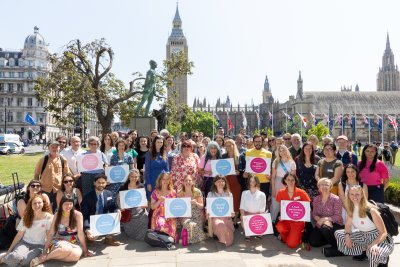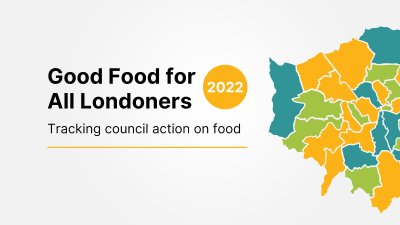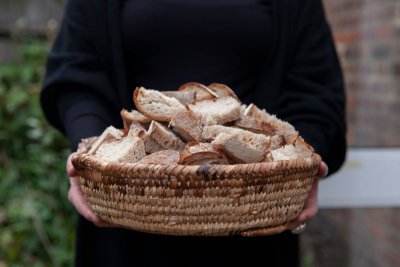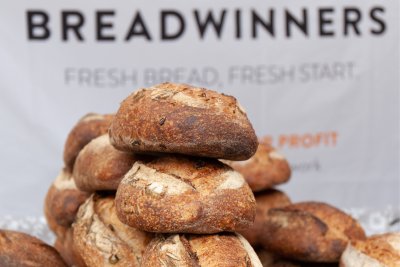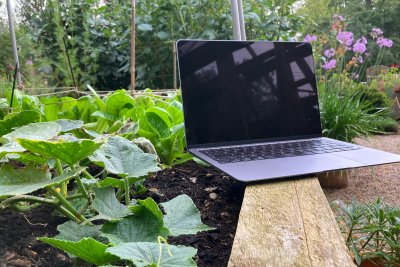A green achievement the cash strapped Olympics CAN afford
In aiming to stage the greenest games ever, London's bid promised to provide “local, seasonal and organic” food. As costs of the Olympics spiral out of control [1] Olympic bosses will be relieved to hear that food for a genuinely 'green games' need not cost more.
A new report [2] Feeding the Olympics from the Soil Association, Sustain and nef calls on London to deliver the promise to be the greenest and healthiest Games in terms of the food they provide, and sets out how this can be done[3]. The report also highlights that London 2012 Olympics offers a unique opportunity to highlight the relationship between physical fitness and healthy food, to transform the food available at all major events, and to showcase the benefits of local, seasonal and organic food on a world stage.
Food plays a vital role in climate change; around 20% of the UK's contribution to greenhouse gas emissions are caused by our food and drink. These emissions can be significantly reduced if we all shift towards eating organic, local, seasonal food, and less meat and dairy products. The Games could also help promote sustainable fish consumption, and ensure that any imported food meets Fairtrade standards.
Two of the leading sponsors of the Olympics, McDonalds and Coca-Cola, want to associate their brands with the image and ethics of the Games. The contradiction between their leading products and the 2012 Games 'healthy' and 'green' credentials are clear and have attracted a good deal of criticism, from politicians, the media and the medical community[4]. The report challenges Coca-Cola and Mcdonalds to meet the promises set out in the bid by serving 75% unprocessed, 50% locally sourced, and 30% organic food and drink. Coca-Cola should pay for access to free non-bottled drinking water for all Games visitors. Around 1.3 million meals could be required over the four-year construction phase, and during the sixty days of Games time approximately 14 million meals will be needed [5] -equivalent to around 2% of the number of school meals served in the UK over a year. Many schools are already serving local, seasonal and organic food [6], highlighting the fact that this is certainly achievable, even within tight budgets.
Other Olympic Games have attempted to be 'green games' with varying degrees of success; Sydney 2000 made some progress [7] but Athens 2004 was roundly condemned for failing to meet environmental promises [8]. By providing green food, London 2012 could achieve a significant green goal, without further adding to its already high budget.
Peter Melchett, Soil Association said: "If London is going to be the greenest games ever, they have to tackle the 30% of our personal carbon footprint which comes from food. And if the Olympics want to avoid looking silly in the face of the obesity crisis now affecting most of the world, they must promote healthy as well as sustainable food. The UK promised "local, seasonal and organic" - now they must deliver."
Kath Dalmeny, Sustain said: “People are trying hard to do their bit, by buying more “ethical” food, but they want big organisations to do their bit too. The 2012 Olympics could make us proud by making sure the tastiest, most sustainable and healthy food ever provided at an Olympics is provided in London.”
Jim Sumberg, new economics foundation said: “A focus on food should be a high profile element of the regeneration agenda allied to the Olympics. There is a real opportunity to create a unique legacy that combines thriving local economies and improved well-being."
It is also important that local food businesses are included in the Games to achieve the much hailed regeneration benefits. There is real potential for locally-owned small businesses, run by people from diverse backgrounds, to work together to supply catering for the Games, but organisers must ensure they have relevant information and support to enable them to bid for contracts.
In fact, there have been few signs that the pledges made related to food are going to be honoured. Indeed the most significant food development so far for what has been promised to be 'the greenest games of modern times' is the loss of the Manor Garden allotment site [9].
Ends
Download Feeding the Olympics as a 475kb PDF
For further information please contact: Kath Dalmeny, Sustain deputy co-ordinator on 07989 557982 / 0203 5596 777 or kath@sustainweb.org
Notes to Editors:
[1] John Armitt, chairman of the Olympic Delivery Authority (ODA) told MPs there was 'no guarantee' the final total would be within the current £9.3 billion budget. This sum is already nearly four times the estimate that helped London win the bid in 2005.
[2]'Feeding the Olympics: How and why the food for London 2012 should be local, organic and ethical' December 2007. Full report available on request. A pdf of the report will be available on the Soil Association, Sustain, and nef websites from 10th December 07 - http://www.soilassociation.org/, www.sustainweb.org, http://www.neweconomics.org/.
[3]12 Steps to a Sustainable Food 2012 Olympics
- The Food for Life targets of 75% unprocessed, 50% local and 30% organic food should be set as a minimum standard for catering contracts. © Soil AssociationPress Release Document: A green achievement the cash strapped Olympics CAN afford 3
- Food outlets should be encouraged to use 100% UK vegetables and 80% UK seasonal fruit.
- 65% of the food sold should be vegetarian or vegan, with meat used sparingly in meat-based dishes; 100% of meat and dairy products should be organic and from the UK.
- Only fish from certified Marine Stewardship Council sources should be used.
- All tea, coffee, chocolate, and fruit and juice (where imported) should be Fairtrade certified.
- There should be minimal food packaging, with all waste reused, recycled or composted; 100% composting of organic waste; 100% reuse or recycling of packaging.
- Free drinking water fountains should be installed throughout all Olympic sites.
- All possible avenues that would allow local, small and medium sized enterprises to participate in catering activities during the construction phase and the Games themselves should be vigorously pursued.
- Before and at the Games, there should be visible and engaging food marketing, that inspires and informs the public on the merits of healthy eating and its role in sports, an understanding of seasonal, local and organic produce available and the benefits of various eating habits for the local and global environment. This should include high-profile athletes promoting healthy and sustainable food.
- All catering staff should be trained in preparing fresh and healthy dishes, and communicating this to their present and future customers, which will provide a sustainable catering legacy.
- As part of the legacy of the Games, all residents in the new communities should have retail access to fresh, healthy and sustainable food within 500 metres. The new developments should provide space for street markets, farmers' markets, food-growing spaces (at ground level and on rooftops) and allotments.
- Building on the Vancouver 2010 Games' commitment to create 2,010 new food-growing sites, 2,012 new food-growing spaces should be created across London, including community gardens, allotments and roof gardens.
[4] A comment piece in the leading medical journal The Lancet remarked that the Games' stated aim of inspiring new generations to participate in sport was “an ambition we find difficult to reconcile with McDonald's and Coca-Cola as official sponsors”. The piece called for governments to examine the broader effects of such sponsorship deals and attach health-promoting conditions to public funding of sport.
[5] Food served at the Sydney Olympics included:
- Milk 75 000 litres
- Eggs 19 tonnes
- Cheese 21 tonnes
- Bread 25 000 loaves
- Seafood 82 tonnes
- Poultry 31 tonnes
- Meat 100 tonnes
Source: Sydney 2000 'games info' archive website
[6] The Food for Life Partnership, lead by The Soil Association aims to transform food culture in schools and communities across England. For further information see http://www.soilassociation.org/foodforlife
[7] Sydney 2000 had a focus on energy use, waste and transport
[8] For example: In the run up to the Olympic games in Athens Greenpeace released a report, "How Green the games" detailing a disappointingly poor environmental record of preparations for the 2004 games. © Soil AssociationPress Release Document: A green achievement the cash strapped Olympics CAN afford 4
[9] The tenants of the allotments, which were established in the 1920s, were granted an alternative site only after they initiated judicial review proceedings. At a time when demand for allotments is increasing35 and the supply is declining, the inability to integrate Manor Park allotments into the development and reluctance to grant them an alternative site showed a worrying lack of commitment to deliver on the promise to support consumption of “local seasonal and organic produce”.
Published Friday 14 December 2007
London Food Link: London Food Link brings together community food enterprises and projects that are working to make good food accessible to everyone in London to help create a healthy, sustainable and ethical food system for all.
